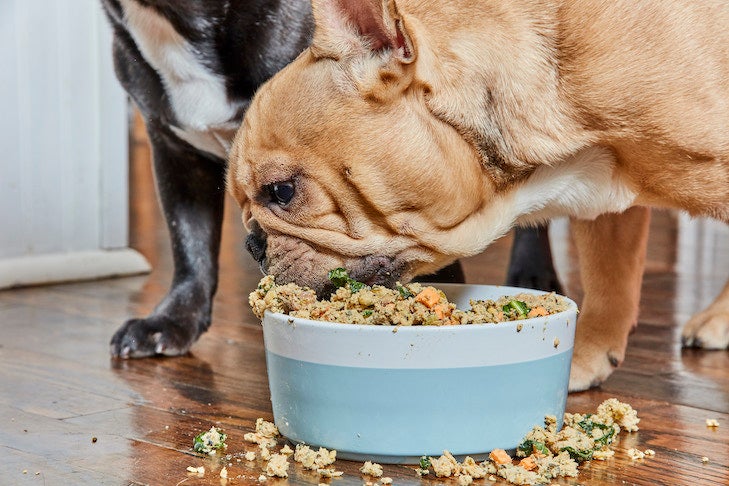Yes, adult dogs can eat puppy food, but it is not recommended as a regular diet. Puppy food is higher in calories and nutrients than adult dog food, so it can cause weight gain in adults if fed too often.
Puppy food is also designed to meet the needs of growing puppies, so it may not provide all the nutrients an adult dog needs. If you do choose to feed your adult dog puppy food, be sure to monitor their weight and health closely.
Can Adult Dogs Eat Puppy Food?
The answer is maybe. It really depends on the ingredients in the puppy food and your dog’s individual needs. For example, if youradult dog is very active, he may need more calories than a less active dog.
Puppy foods tend to be higher in calories than adult foods, so this could be beneficial for a high energy dog.
Is It Safe for Adult Dogs to Eat Puppy Food?
There is a lot of debate surrounding this topic, with many people believing that it is not safe for adult dogs to eat puppy food. However, there is no concrete evidence to support this claim.
Puppy food is typically higher in calories and fat than adult dog food, which can be beneficial for growing puppies who need the extra energy. However, if an adult dog eats too much puppy food, they may become overweight or obese.
It is important to consult with your veterinarian before making any changes to your dog’s diet, and to feed them the appropriate amount of food based on their age, weight, and activity level.
What are the Benefits of Feeding Puppies Dog Food?
Feeding puppies with appropriate puppy food offers several benefits that cater specifically to their unique nutritional requirements during the crucial growth and development stages. Here are some benefits of feeding puppies dog food:
- Balanced Nutrition: Puppy food is formulated to provide the optimal balance of proteins, fats, carbohydrates, vitamins, and minerals that are essential for healthy growth. It ensures puppies receive the right nutrients in the right proportions to support their rapid bone, muscle, and organ development.
- Adequate Calories: Puppies have higher energy needs than adult dogs due to their active lifestyle and rapid growth. Puppy food is typically higher in calories to meet their increased energy requirements, helping them maintain appropriate body weight and sustain their energetic nature.
- Protein for Muscle Development: Protein is crucial for building and repairing muscles, tissues, and organs. Puppy food contains higher levels of high-quality proteins, such as chicken or beef, to support optimal muscle development and overall growth.
- Essential Fatty Acids: Puppy food is enriched with essential fatty acids, including omega-3 and omega-6 fatty acids. These nutrients promote healthy skin and a shiny coat, support brain development, and contribute to a robust immune system.
- Dental Health: Some puppy foods are designed to promote dental health. They may have a kibble size or texture that helps clean teeth and reduce the formation of tartar and plaque.
- Digestive Health: Puppy food often includes ingredients that aid in digestion, such as easily digestible proteins and fibers. This supports a healthy digestive system and helps prevent digestive issues like diarrhea or constipation.
Are There Any Risks Associated With Feeding Adult Dogs Puppy Food?
There are a few risks associated with feeding adult dogs puppy food. The first is that puppies need more calories than adult dogs, so they could end up gaining weight if they eat too much puppy food.
Puppy food also contains more fat and protein than adult dog food, which could cause problems for adults with kidney or liver disease. Finally, some puppies are allergic to certain ingredients in puppy food, so it’s important to talk to your vet before switching your dog to a new diet.

Credit: www.akc.org
Can a 1 Year Old Dog Eat Puppy Food?
Puppy food is formulated to meet the nutritional needs of rapidly growing puppies. It is higher in calories and certain nutrients than adult dog food.
For that reason, many experts recommend that puppy food only be fed to puppies during their first year of life. Some people choose to continue feeding puppy food to their dogs after the first year, but it isn’t necessary.
If you do decide to switch your dog to adult food after the first year, make sure to do so gradually over the course of a week or two to avoid upsetting your dog’s stomach.
Difference between Puppy And Adult Dog Food
Puppy food and adult dog food are not the same. Puppies need more calories, fat, and protein than adult dogs. They also need certain vitamins and minerals in order to grow properly.
Adult dogs, on the other hand, do not need as many calories and can actually gain weight if they eat too much puppy food. The main difference between puppy food and adult dog food is the amount of each nutrient that is present.
Conclusion
Yes, adult dogs can eat puppy food, but they don’t need to. Puppy food is higher in calories and protein to support a growing pup’s rapid growth.
Once your dog is an adult, he’ll do just fine on an adult food formulation. If you’re unsure which food is best for your dog, ask your veterinarian for a recommendation.